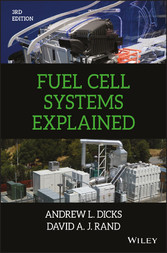
Fuel Cell Systems Explained
von: Andrew L. Dicks, David A. J. Rand
Wiley, 2018
ISBN: 9781118706978
, 488 Seiten
3. Auflage
Format: PDF
Kopierschutz: DRM
Preis: 105,99 EUR
eBook anfordern 
Mehr zum Inhalt

Fuel Cell Systems Explained
Since publication of the first edition of Fuel Cell Systems Explained, three compelling drivers have supported the continuing development of fuel cell technology. These are: the need to maintain energy security in an energy-hungry world, the desire to move towards zero-emission vehicles and power plants, and the mitigation of climate change by lowering of CO2 emissions. New fuel cell materials, enhanced stack performance and increased lifetimes are leading to the emergence of the first truly commercial systems in applications that range from fork-lift trucks to power sources for mobile phone towers. Leading vehicle manufacturers have embraced the use of electric drive-trains and now see hydrogen fuel cells complementing advanced battery technology in zero-emission vehicles. After many decades of laboratory development, a global but fragile fuel cell industry is bringing the first commercial products to market.
This thoroughly revised edition includes several new sections devoted to, for example, fuel cell characterisation, improved materials for low-temperature hydrogen and liquid-fuelled systems, and real-world technology implementation.
Assuming no prior knowledge of fuel cell technology, the third edition comprehensively brings together all of the key topics encompassed in this diverse field. Practitioners, researchers and students in electrical, power, chemical and automotive engineering will continue to benefit from this essential guide to the principles, design and implementation of fuel cell systems.
ANDREW L. DICKS, PHD is an Independent Consultant and Adjunct Principal Research Fellow at Griffith University, Brisbane, Australia. DAVID A. J. RAND, PHD, SCD was a Chief Research Scientist at CSIRO where, among other duties, he served as scientific advisor on hydrogen and renewable energy. In retirement, he is now a CSIRO Honorary Research Fellow, Melbourne, Australia.





